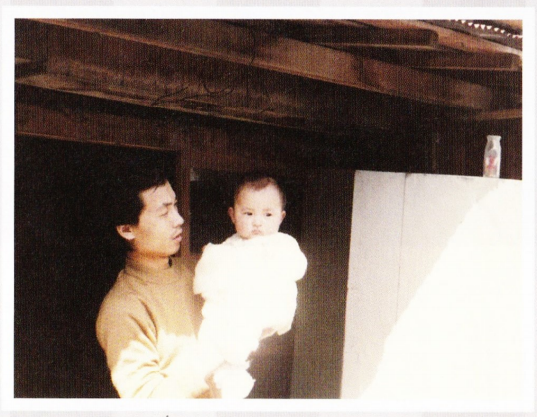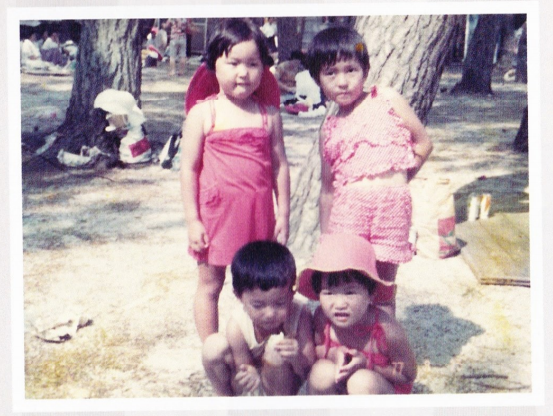This book is a memoir of Aran Kei’s time as a member of Takarazuka, as well as her post-Takarazuka career and memories of her childhood. It was published in 2010 to commemorate the 20th year of her stage career. It also features messages from Takarazuka classmates and other colleagues and theatre artists she has worked with.
Some paragraph breaks have been added for ease of reading in English. I have also collected many archival images from various sources to illustrate the book.
My precious, precious family

My father and mother lived in the same neighborhood, and it might have been inevitable that they met. According to my aunt they were a ‘beautiful country couple’, and they both always stood out. Both my parents were really fashionable, and I can clearly remember how my mother looked wearing a wide-brimmed hat or with her hair tied up in a handkerchief. My father also took great care over his fashion and liked wearing the latest styles, and even drove around in a Lincoln car.
When I was little I just rode around in it without really understanding anything, but when I thought back on it as an adult, it’s amazing that he was able to rattle around in it along those narrow rural roads. And since we had those kinds of parents, their children were also always able to wear fashionable clothes as well. Every New Years’ all of us siblings would get new clothes and new underwear, and I remember being really happy every time. Every New Years’ we would put on our new clothes and go to grandparents’ and other relatives’ houses to greet them, and then go to the temple to say sutras for our ancestors.
My older sister was the only one of us who went to a North Korean school, and I felt jealous of that sometimes. I have a younger brother, but I feel like with our personalities, I ended up more in the role of oldest son in our family. I’m closest with my younger sister, and we even lived together for a while. Me and my younger sister really resemble each other, but her face is more feminine and cute, and she’s popular with men, so it’s the same pattern as the sisters in ‘Wonderful Town’. Even if we’re out walking together, men only call out to my sister. And then a lot of the time, when they realize I’m with her the men will vanish. They disappear so quickly I’ll wonder, did I intimidate them? (LOL)

My sister is an extremely clear-headed person, though you might not guess it from her looks. She has good decision making skills and can help with romantic problems. When I’m hesitating over something she’ll tell me directly ‘You’re not gonna get anywhere worrying about that!’. She’s really reliable. I’ve sometimes had her give me pointers on how my costumes look from the audience when she comes to see my performances.
My parents divorced while I was in middle school, and we lived apart from my mother, but my father and mother would both come to see all of my performances. My mother was delighted just to see me on stage, and I don’t remember her ever criticizing anything. My father would tell me all sorts of things about what he noticed, so it made a nice balance. If both of them had told me what I could do better I feel like I might have asked them to stop coming to watch me (LOL).
On the opening day of Wonderful Town, my mother died. Her condition worsened very rapidly, and I wasn’t even able to see her on her deathbed. My mother was a very cheerful person, who loved to make people happy. So I’m certain if she had been able to see that show she would have laughed so much. Why do I have to be in a comedy making the audience laugh on a sad day like this where I just lost my mother, I thought at the time. But if it had been during MITSUKO or Edith Piaf, I don’t think I would have been able to handle portraying such a painful life with those painful feelings. So now I’m glad that my mother chose the opening day of Wonderful Town.
My mother battled her illness for 5 years. The cancer was already terminal when it was discovered, but despite the fact she was told she could only live another 3 months, she made it 5 years after that. Thanks to that she was able to see me as Top Star. Even though she was fighting the disease, she would come from the hospital in Kyoto to see all of my performances, and told me she always looked forward to it.
The last time I saw my mother was for her birthday, in August. By that time she was in a hospital in Shiga so I couldn’t go to see her regularly, but I managed to get a bit of time off then and the two of us celebrated her birthday together. 3 days after the performance opened I had a day off, so I was able to make it to the funeral. The funeral was supposed to be right away, but apparently that was an inauspicious day so it was delayed. Thanks to that I was able to see my mother’s face one last time. When I saw my mother lying there peacefully, all that came to my mind was regrets. Did I really perform filial piety the way I should? Was my mother really happy? Why did she never remarry? There were so many more things I wanted to talk to her about.
When I organized all the things my mother left behind, I found that she had carefully kept a letter I wrote to her. I didn’t really remember writing it, but it was telling her that I’d decided on my stage name for Takarazuka and the explanation of it. Because all of us children lived apart from my mother, I never really talked to her much about things we could talk about as fellow women, like romance and things like that. She never taught us any recipes, so us siblings talk sometimes about how we can’t bring back the flavors of the things we ate when we were little. My mother was an excellent cook, so she could make kimchi and all kinds of delicious things. I greatly regret that none of us children inherited the ability to create those flavors.
What I inherited from my mother was my cheerful personality. Thinking back, my mother’s way of raising us was a bit eclectic. For example, if I told her about something I was upset about, she’d get angry together with me. Watching her like that, soon I would forget why I was so angry and my feelings would change to ‘well, you don’t have to go that far, you know!’. I don’t know if it was a deliberate tactic of hers or not, but she helped me out so many times that way, and the way she let me feel like I had at least one person on my side gave me a lot of confidence. Therefore, I miss my mother a lot when I’m upset about something.
Something I think about when burning incense in front of her picture is, if she had lived to see it, I would have liked to ask her what she thought of my performance as Mitsuko. My mother was never negative towards her children, and interacted with them a lot. In that way, her life was different from Mitsuko’s, yet they are similar in that they both lived a long time alone without remarrying. How would she, as a woman and a mother, have seen Mitsuko’s life? I can only ask her in my dreams now. The one thing I know without having to ask is that Mitsuko and my mother were both strong women. Living alone, she raised four children even though she didn’t live together with them, and didn’t lose heart in the face of any circumstances. She was also a very flexible person who would first see what she could try, rather than seeing things negatively.
I think my mother will continue to be a great influence in my life in the future as well.
